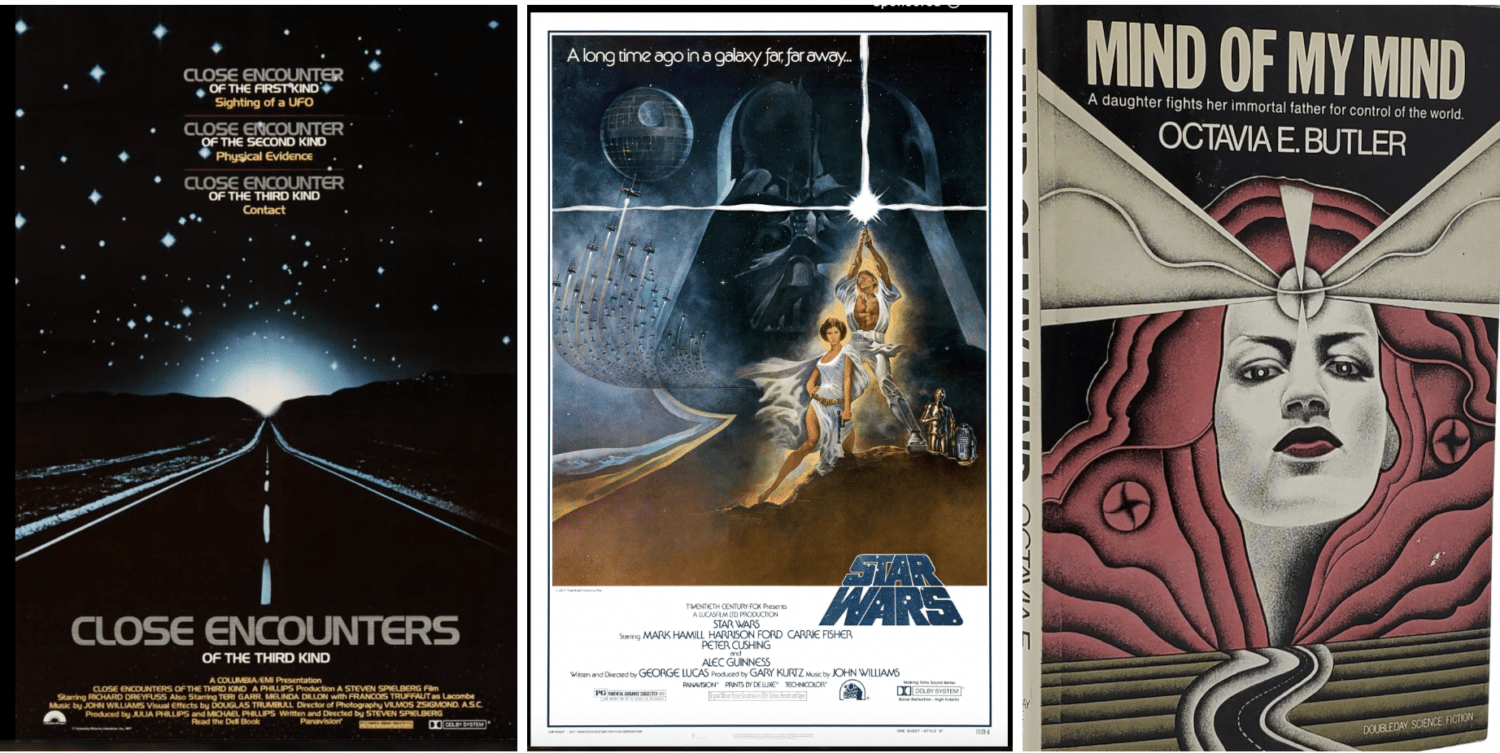
It’s 1977, and I am a nerdy, awkward, restless child. (Try to look surprised.)
My mom takes me to two life-changing movies: the original Star Wars, and Close Encounters of the Third Kind (this hotlink is Siskel and Ebert, in 1977). I. Am. TRANSFORMED. I realize I feel like an alien. I realize other people feel like aliens. I realize not everyone hates aliens. I am inspired to be braver, even though I am horribly, painfully shy, and help others whenever I can.
Science fiction is a terrific teacher, IMO, because 1) Science and 2) Fiction.
No, really.
I’m going to nerd out for a sec.
We all know humans have basic needs (food, air, water, shelter). When the act of meeting these needs is reframed in a mythical environment? Presto! We get the best (the only?) way to talk about the conflicts that arise or the problems that occur as a result of humans seeking those necessities. (Check out this article by Sherryl Vint .) Because conflicts and problems are what drive a story arc, science fiction is also exciting and dramatic. Sci-Fi becomes the perfect medium! And the characters in this genre are trying to get the same fundamentals as ourselves, so we lean in emotionally and intellectually. No matter the world, we connect with these characters trying to fulfill their needs.
Whether you love spaceships or space opera, Bots, Borgs or Droids, science fiction is a PERFECT vessel for deep human truths.
Here’s 3 big things I’ve learned from science fiction
Grow some empathy
There’s a Star Trek episode, “The Devil in the Dark,” in which a mining operation is being attacked. Kirk has a face off with a silicon rock-like creature, a Horta, seemingly hell-bent on killing him. But this wholly alien creature is more like us than she seems. As Spock steps in to connect with her (through the Vulcan mind meld), we learn that she’s the last mom of her kind, desperately trying to save her species by guarding the only eggs that have not been broken by miners. Needless to say, Kirk chooses to spare her and they broker a truce, a bit of a TV-happy ending, but poignant nonetheless.
Lesson: Take a moment. Extend some empathy. Work it out. Or in the immortal words of Bill and Ted, Be Excellent to Each Other.
Things that live in holes in the ground in the desert are probably trying to kill you
Say you live in someplace chock full of trees and waterfalls and pastureland, like upstate New York for example. You visit a desert area, and people say “Shake your shoes out before putting them on in the morning” and “Watch where you’re walking.” For a hot second, your brain says, wait what? Then you remember.
The Shai-Hulud! (The sandworms from Dune!)
The ‘Predatory Fauna’ in the mining crater in Murder Bot! (In “All Systems Red”!)
THE SARLACC!!! (!!!)
And then you become a bit hypervigilant.
I’ll add a corollary: “Pay attention to nature or you’ll be sorry” is also true on a larger scale. Witness the many science fiction narratives in which the actions of humans in excess bring on environmental disaster which in turns leads to social disaster. Star Trek IV: The Voyage Home, Andor, Octavia Butler’s “Parable of the Sower”, Murderbot, and so many more hinge on the tragedy and greed associated with resource hoarding/exploitation. Even in the frolicking Hitchhiker’s Guide to the Galaxy, Earth is slated for demolition to make room for a hyperspace bypass.
Lesson: Be mindful.
Just because you think the food looks strange, doesn’t mean it’s not delicious

I swear every science fiction writer is giggling into their bone broth when they create “foods the locals eat”. I certainly had fun cooking up some dishes, so to speak, for The Mysterious CHIRP podcast, but I had even MORE fun listening to every actor create brilliant and hilarious things to eat (I wept from laughter while trying not to spoil the take). In real life, don’t be a cultural isolationist. When in Rome and all that. Or, as my mother would say,
Lesson: Try it! You might like it!
Final thoughts on lessons from Sci-Fi
I think we’re drawn to stories that are our own, one step removed. They help us think about actions and consequences. They facilitate conversation, however indirect, around difficult concepts, challenges, and hardships. And they bring people together around favorite characters, beings who inspire us to try new things, be mindful, and be excellent to each other.